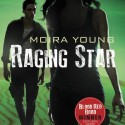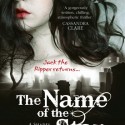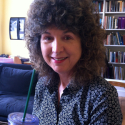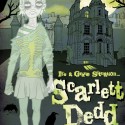Moira Young talks Raging Star & the Dustlands Trilogy
ThirstForFiction talks with Moira Young, author of the Costa award winning DUSTLANDS TRILOGY, the final book of which, RAGING STAR, comes out on 1st May in the UK.
Buy Raging Star:

Transcript
Rhys: I’m here with Moira Young author of the Dustlands Trilogy the final book of which, Raging Star, is out in May. Nice to have you here, Moira!
Moira: And you Rhys. Thank you for chatting!
Rhys: I’ve got a few questions here for you…
Moira: Ah okay!
Rhys: And I want to start briefly with your background in opera singing, because I understand that was your major profession beforehand?
Moira: Well, I started off as an actor, actress, and then I went into opera, yes, when I was about thirty, I became and opera singer and I sang professionally for about ten years, yeah.
Rhys: Why did you make the change to writing?
Moira: Well various reasons really, the opera jobs sort of started to dry up – the paying jobs, anyway – and it sort of seemed like the moment I said I can’t sing unless I get paid for it the jobs started to dry up. So there was that, there was a bit of a natural break, and we, all sorts of things happened but the main thing was that I was reassessing my life, I think it was one of those periods where you take a look at what you’re doing and you have to think whether or not you spend the next ten years or so doing what you’ve been doing. And this was one of those moments, and in fact writing was my first ambition, so it had been in the back of my mind for a while and I’d always done some bits of writing whilst I was acting – writing shows and that sort of thing, even in opera I used to write my own shows and that sort of thing, so it grew out of that this little voice persistently nagging at me and it finally nagged me into signing up for a course in writing for children at the City Lit in London which is an all commerce course which in fact is where Malorie Blackman started off with the very same tutor and Sophie McKenzie.
Rhys: Bit of name dropping there!
Moira: Well, the City Lit is great! You know, I can’t speak highly enough about the sort of grounding in skills, just , you know, storytelling skills I got from Elizabeth Hawkins who teaches the course there so that’s what started me off.
Rhys: Do you think your backgrounds in theatre has any kind of effect on your writing?
Moira: Huge, absolutely huge. And I don’t think I realised that and I don’t think I knew that that would be my sort of grounding and it took me a while to find that in fact, that was there my voice lies in using really who I am, my performing skills and my life as a performer, a singer and an actor, and really I wouldn’t be the type of writer if I hadn’t had those previous incarnations. It absolutely is who I am and where my voice as a writer comes from, comes from acting through dialogue and I love to use dialogue and as you may have noticed maybe I’m not huge on long passages of description or things like that and I like finding characters voices, I’ve discovered.
Rhys: So for you it’s all about telling the story through eh characters rather than anything else?
Moira: Yeah, absolutely, and the singing comes through in the rhythms I find in my writing and I really have discovered more and more as I’ve gone through this trilogy. I had some of that inadvertently really – not consciously at all – in Blood Red Road, it just came out in this very simple spare way. But as she, my main character Saba, started to develop as a character and as the story became more intense, the rhythms I discovered became more important and I also discovered they carried the pace of the story along for me. So it really helps me to use those musical rhythms and phrases that seem to come from my musical background.
Rhys: How does that work in practise?
Moira: In practise that means that I speak aloud all the time and I’ll work my way through a paragraph and it has to have a certain rhythm from line to line, within each line and the paragraph as a whole. Not all the time sometimes that, you know, slows things down, but sometimes it can speed things up, it just depends. But I seem to know when those moments are there and I have to work my way through very carefully. And Recording the audio books I knew that I would be recording this book Raging Star, so I was even more conscious this time of working with the rhythms and finding the strength of the story within the rhythms.
Rhys: So it’s a lot more like poetry than other writing maybe?
Moira: I guess so, yeah, and I did read a lot of poetry whilst I was writing and I was very tired when I was writing this because I went straight from Rebel Heart into Raging Star – I think I had a week off – so I was really very tired when I started writing, and I used the energy of the poetry I was reading to lift me and shock my brain into different tracts. It was incredibly necessary to me.
Rhys: What kind of poetry was that, just out of interest?
Moira: I was reading Mary Oliver, do you know her? She’s an American poet, she’s in the tradition of nature poets, those wonderfully powerful American nature poets.
Rhys: Like Robert Frost maybe?
Moira: Yeah exactly, Frost, Emerson, all that sort of tradition. It’s very elemental.
Rhys: So that definitely comes through in the series.
Moira: So yeah, she’s about 80 now I think but she’s a wonderful writer. And I was also reading writers like Ray Bradbury. I was reading him because he uses language in such an extraordinary way. It wasn’t that I was copying anybody – please let me not be copying anybody! – but I just found that they pushed my brain into a different gear and my tired brain needed a lot of pushing.
Rhys: I’m going to your actual voice, in the books, you’re probably bored of talking about this by now because it’s the question everyone asks you!
Moira: No, well, I’m very happy to talk about it!
Rhys: Because, when I read it, it feels very like a progression of American slang, but I’ve noticed you’ve used words from the West Country, that’s completely different, so what does it sound like for you?
Moira: Well, it sounds Canadian to me. And if you hear me read the audio books it’s just me. But what it is is I’m a magpie for words and phrases and if something appeals to me I try to use it. I get a lot of it from my dad, he’s a Scotsman, but his dad was in the Indian armies, so there’s a lot of old fashioned bits of you know slang or phrases they come from all over, I’ve got a few things from my husband’s aunt who’s from Nottinghamshire, like skellington and chimley, and some bits are West Country, some people say they hear West Country in it, some people say they think it’s from the American South, some say it’s absolutely Canadian, so I think it depends where you come from and what you bring to it. And I’m very happy not to impose that I would hate anybody to think that I was trying to do a particular dialect from anywhere because obviously I would have failed horrible if I were
Rhys: So you’ve mentioned earlier that you’ve read Raging Star as an audio book-
Moira: I’ve read all three actually.
Rhys: -all three. So what choice was that made by you or how did that come about?
Moira: Well, there is in fact an actress in America who’s called Heather Lind who’s very good, but we were going to have someone else read them here – and then we had a meeting with the producer and we started to talk about, she had some particular questions about how things were pronounced, so I started to mention the rhythms to read as, you know, as an example and she asked if there was any possibility of me doing them. And after we chatted about it Scholastic and I thought it would probably be best if I did them and I was very glad to and delighted to!
Rhys: As an actress I guess you’ve got training in that field anyway.
Moira: Well, I did do a little bit of reading audio when I was acting.
Rhys: But in terms of reading aloud you’ve got-
Moira: Yeah and I do it when I write so I know exactly how I mean it to be so I’m glad of the chance to do that, actually it was a real treat – that was my reward for doing all this!
Rhys: I’m very excited to hear you do a quick reading at the end of this. I haven’t actually heard the audio books but obviously it’s a book made for reading out loud.
Moira: Yeah, it really is, you know there was a certain point when I was writing Blood Red Road when it seemed so artificial to be writing it down because I heard it so clearly in my head, and I was speaking it and it seemed so natural and I just thought, I just wish I could speak this directly into people’s heads – that would be the true way of telling this story, just orally.
Rhys: My question…if I can find it! Ah yeah – I read in a blog post recently that you recently set Blood Red Road in this first edition in an icy wasteland type thing.
Moira: Well in fact it was set in an ice world in this country, in the Peak District, which is an interesting thought! That was my very earliest attempt to tell a story this story about a girl whose brother is taken from her and she goes in search of him. And it was very different in almost every way possible and the only things that remain from that story are the names of the characters – Saba, Lugh and Emmi, the three siblings, otherwise absolutely everything else is different. And the fact that it’s set in the future.
Rhys: Why did you change the setting?
Moira: Because I started to write that, in fact I probably wrote …it’s fading mercifully into the darkness of my memory, I think I wrote about 18,000 words of that book, and it was in third person, a very conventional third person narration and I had, because we moved house, I had to stop writing and put it aside for a time and when I came back to it, it was about 3 months later and I picked it up and I read it and I thought, my immediate reaction was, I don’t believe this, this is not something I feel strongly about to pursue it anymore. So I had to abandon that and start all over again. And that’s when I started to experiment with her voice – I changed her age quite a lot and I guess something had just shifted inside of me with the story, and I didn’t even know that what I needed was to find her voice but in fact that was what I was searching for. I mean I wasn’t an experienced writer to know that was what I ought to be doing, but I just instinctively started to experiment with voice and I found my way eventually, after a long period of time, to that voice that ends up in Blood Red Road.
Rhys: So was there any reason for the change of scene from the cold to the desert-like?
Moira: Well that’s interesting; the voice and the setting came together, really with the voice came the landscape. It was very interesting and I discovered in fact that I’d moved from the Peak District and an ice world to these very large landscapes that of course I know very well form my Canadian life. I grew up on the prairies, I also grew up on the coast and those huge mountains. So those huge landscapes are in my visual DNA and I had not been using them…so the voice in fact was quite natural to me, and the landscape was quite natural to me and I had been searching searching searching writing writing writing in order to get back to myself.
Rhys: What strikes me about the setting is that it has this kind of western feel.
Moira: Yeah absolutely, well that’s how I envisaged it, as a western, very much, because those were the films I watched as a kid, my dad watched westerns and I used to just sit in the basement and watch old black and white westerns on Saturday afternoons because I was a very antisocial kid!
Rhys: I mean, in terms of characters as well and character arcs as well they’re very sort of…very western.
Moira: Oh yeah, very western, I mean the lone hero is very much, it’s the hero myth of North America, of the States, rather than Canada. But it’s the lone cowboy figure and that’s really what she is, Saba. And also westerns are about the individual against this big landscape, this character that is the landscape. And the difficulty of making a life in this hostile landscape which is so much more powerful than a person, a small person.
Rhys: So now that the Dustlands have finished, where do you think you’ll be going?
Moira: Well that will be interesting, won’t it! I’m very interested to see what happens, I’m gonna have to let enough time pass that this voice subsides back into me and that another one emerges. I have some inklings of a story, I feel like there’s a story brewing in me and that’s about all I can say at the moment. But it’ will take some time, I‘m not gonna rush.
Rhys: You’re gonna take a long awaited holiday!
Moira: I’m going to take a much needed holiday and just fill up the well again. It’s been drained dry!
Rhys: Somewhat unrelated really is why you chose to write YA fiction, or children’s fiction?
Moira: I didn’t really choose to, I just did. It’s where I belong, and why is that?… I think it’s because the books that have stayed with me my entire life and have informed who I am are the books I read when I was a child and a young adult…and I think those are the stories that have meant the most to me and that not just books but also movies. And the Wizard of Oz is my big one of course, which I think my first American editor asked if this was not just some extended meditation on the Wizard of Oz and I’m inclined to think she might have been right! But that’s why, I guess, that’s where I belong I feel. That’s where I belong and I think my inner age is possibly around fifteen and possibly my outer age also!
Rhys: Lastly, perhaps, and this is maybe good for you reading, is whether you have a favourite passage from all three books?
Moira: Oh, you know, I don’t really. There are bits that are better to read, obviously.
Rhys: Do you not just have a section where you’re really proud of how you’ve phrased something?
Moira: No, not really, because I just want to get out a red pencil and change things! Of course, I want to start rewriting things. No, I don’t reread them unless I have to do a reading and then I just hone in on something but no, I’m not particularly attached. I like the repetitions I’ve been able to weave through, those I like.
Rhys: I noticed – I’m ¾ through Raging Star –
Moira: Which you love, of course! You’re crazy about this book!
Rhys: Of course – I want to have a whole different conversation with you which will be full of spoilers but I’ll spare that for off camera! But yeah, you kind of repeat passages from previous books and kind of …
Moira: It weaves through, it’s the sort of thread that I hope brings it all together. I think that’s the musical thing as well, the repetitions of musical themes in a way and they’re generally a big overall arching theme about fate and destiny and how much we’re in charge of our own lives in the end
Rhys: I mean the other things about those things is that some of them are in third person
Moira: In the last two? Yes I know. That’s interesting. You know it’s choosing to have a very close first person –
Rhys: I guess it limits you?
Moira: It gives you challenges, particular challenges, and so I really felt that with her world opening up the voice had to open up a little more too, the voice had to open up to allow other points of view and I think that reflects yes, the widening of her world and the fact that it’s not about her – and only about her – and what she wants any more. What other people do absolutely affect what happens to her too, and that’s what she discovers throughout these books, that she can’t stand alone, is that she does need other people. And that informs the choices that she makes in the end.
Rhys: Well I guess that’s it for now. Thank you very much!
Moira: My pleasure Rhys lovely talking to you!





